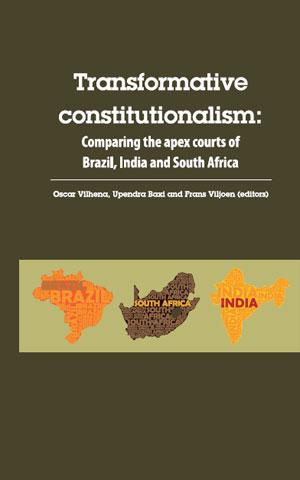Transformative constitutionalism: Comparing the apex courts of Brazil, India and South Africa
Edited by Oscar Vilhena, Upendra Baxi and Frans Viljoen
2013
ISBN: 978-1-920538-23-1
Pages: x 677
Print version: Available
Electronic version: Free PDF available
About the publication
This peer-reviewed book contains a number of contributions about the role of the highest ('apex') courts in Brazil, India and South Africa, in giving effect to the generous group of rights recognised by the aspirational constitutions of these three countries. It is the result of a collaborative research project between researchers in the three countries, involving academics, human rights activists and a judge.
The aim of the book is to provide starting points for a horizontal South-South-South 'trialogue' about transformative constitutionalism. While not laying claim to provide a comprehensive comparison of every important aspect covered in each of the three Constitutions, the book focuses on selected thematic areas, including gender, socio-economic rights, land rights and the role of civil society.
About the editors:
Oscar Vilhena is the Dean of the law school at the Getulio Vargas Foundation in Sao Paulo.
Upendra Baxi is Professor of Law in Development, University of Warwick.
Frans Viljoen is Director at the Centre for Human Rights and Professor of International Human Rights Law, University of Pretoria.
Table of Contents
CONTRIBUTORS
PART A: INTRODUCTION AND CONCEPTUALISATION
- Introduction
Oscar Vilhena, Upendra Baxi and Frans Viljoen - Chapter 1: Preliminary notes on transformative constitutionalism
Upendra Baxi - Chapter 2: A brief response to Professor Baxi
Theunis Roux - Chapter 3: A global constitution of rights: The ethics, the mechanics and the geopolitics of comparative constitutional law
Conrado Hübner Mendes - Chapter 4: Of selves and others: A reply to Conrado Hübner Mendes
Henk Botha
PART B: OVERVIEW OF THE THREE CONSTITUTIONS AND APEX COURTS
- Chapter 5: Descriptive overview of the Brazilian Constitution and Supreme Court
Oscar Vilhena Vieira - Chapter 6: Descriptive overview of the Indian Constitution and the Supreme Court of India
Shylashri Shankar - Chapter 7: Descriptive overview of the South African Constitution and Constitutional Court
Wessel le Roux - Chapter 8: The role and impact of international and foreign law on adjudication in the apex courts of Brazil, India and South Africa
Juana Kweitel, Ranbir Singh and Frans Viljoen
PART C: SPECIFIC RIGHTS AND THEMES
Gender
- Chapter 9: The role of the Brazilian Supreme Court in the implementation of women’s rights: Bridging constitutional norms and reality
Daniela Ikawa - Chapter 10: Gender justice and the Indian Supreme Court: The post-colonial project
Indira Jaising - Chapter 11: Gender and transformation in the South African Constitutional Court
Sandra Fredman
Sexual minorities
- Chapter 12: On pluralism and its limits: The constitutional approach to sexual minority freedom in Brazil and the way ahead
Samuel Friedman and Thiago Amparo - Chapter 13: A new language of morality: From the trial of Nowshirwan to the judgment in Naz Foundation
Arvind Nairran - Chapter 14: Sexual minority freedom and the heteronormative hegemony in South Africa
Jaco Barnard-Naudé
Religion
- Chapter 15: Commentary on the constitutional aspects of religious freedom in Brazil
Eloísa Machado de Almeida - Chapter 16: Right to religious recognition in India: A comment
Shylashri Shankar - Chapter 17: Right to recognition and protection of religion in South Africa
Mtende Mhango
Socio-economic rights: Health and livelihood
- Chapter 18: Between usurpation and abdication? The right to health in the courts of Brazil and South Africa
Octavio Luiz Motta Ferraz - Chapter 19: Realising the right to health through co-operative judicial review: An analysis of the role of the Indian Supreme Court
Amita Dhanda - Chapter 20: The South African Constitutional Court and livelihood rights
Danie Brand
Land
- Chapter 21: Finding common ground: Rights arising from land reform in South Africa, India and Brazil
Vinodh Jaichand
Social movements and apex courts
- Chapter 22: Remarks on the role of social movements and civil society organisations in the Brazilian Supreme Court
Marcela Fogaça Vieira and Flavia Annenberg - Chapter 23: Swallowing a bitter PIL? Reflections on progressive strategies for Public Interest Litigation in India
Arun K Thiruvengadam - Chapter 24: Social movements and the Constitutional Court of South Africa
Tshepo Madlingozi
PART D: RIGHTS BEYOND THE STATE
- Chapter 25: Sovereignty, citizenship and the universality of socio-economic rights
Sammy Adelman - Chapter 26: Human rights beyond the state: Exploring the challenges
David Bilchitz
PART E: JUDICIAL PERSPECTIVE
- Chapter 27: Reflections of a retired Judge
Justice ZM Yacoob
PART F: CONCLUSIONS
- Chapter 28: Some concluding thoughts on an ideal, machinery and method
Oscar Vilhena Vieira, Upendra Baxi and Frans Viljoen
SELECTED BIBLIOGRAPHY
